Pickathon 2016 [Part 1]: Early Thursday Entry (the layout, Kevin Morby, & blacklight sex grooves)
This year we opted for the Thursday entry into the Oregon music festival. Here’s a breakdown of the general set up & what we caught by showing up early.

While grabbing our credentials, the woman at the media check-in asked us if we had a toddler. We do — or did; he’ll be 5 next month — but we hadn’t brought him to Pickathon since the first year that I attended in 2013. It was easy enough to find an image of him; my current Facebook profile photo is, actually, of my son sitting on my lap at the festival, and I’d just received one of those “memories” from the social media giant in the form of a 3-year-old video consisting of him dancing around in protective headphones to Kurt Vile at the mainstage. Yep, that’s the kid that she remembered. We hadn’t even made it to the main property yet, but I already felt welcome. Welcome isn’t a feeling that I would generally associate with a major music festival, but that’s exactly why I keep showing up to this one.
This was the first year that we opted for the Thursday early entry passes, which allow you to get there a day in advance and, hopefully, catch a prime camping spot in the woods of the Pendarvis Family‘s 80-acre Happy Valley, Oregon property where the festival is held each year. Early performances are lined up for those willing to throw down for the Thursday pass, as well. Last year, The Flaming Lips showed up as part of a special episode of Portlandia that was being filmed there; an exciting once in a lifetime opportunity, or a somewhat contentious invasion of interlopers, depending on who you ask. Many Portlanders resent the attention that the IFC comedy has already brought to their city, which is experiencing some pretty severe rent hikes, these days, due to an influx of transports. If possible, those who frequent Pickathon might be even more protective of their little community being contaminated and over run by mobs of “outsiders” endangering the preservation of what has miraculously managed to remain such a consistently douchebag-free experience over the last 18 years. In fact, I acknowledge my own delicate responsibility to honor that legacy, even in writing about it now. This is my third time reviewing the festival and I came away with the same feeling this year that I have the other two: it’s an experience that you want to tell the entire world about, while, at the same time, feeling protective enough that you don’t want anyone else to ever find out about it. As for Portlandia filming there, I can say that, during the first year that I attended, I did run into Fred Armisen, who wasn’t even there to perform, and our brief conversation that we had was based on an honest mutual appreciation for the festival and environment that they’ve been able to foster there. From that experience, my belief is that his intentions were genuine in bringing his film crew there, if nothing else. He’s a fan, just like the rest of us.
The Thursday music started around 3pm, but after driving all the way out there from Seattle and setting up our camp, we didn’t make it down to the main festival area until the squaredance was going on (somewhere between 7:50 and 9pm). This was the only event taking place on the Mountain Stage (mainstage) that night and seeing families and children dancing around made me miss my son instantly. There’s always a ton of stuff for kids and this year there seemed to be more than ever, including the usual interactive circus activities, music and craft workshops, a kids stage, a waldorf school, and even drop off camps/daycares to give you a break. Plus, they get in for free until they are 12, with a half-priced teenage ticket, after that. You’ll find kids selling handmade goods and busking with fiddles and guitars down the trails all weekend. It’s never too crowded and this is just about the only festival where I’m not sketched out about the idea of bringing my child for fear that some wingnut is gonna blow smoke in his face or step on him while plastered drunk. He did great when he was almost 2, so the only real reason that we didn’t bring him, besides the fact that he’s at an age where he likes to bolt off and would probably find 4 full days a bit of overkill, is because we wanted to go pretty hard at this thing without one of us (namely, his mother) having to head back to the tent early. If he were with us now, it would already be time for them to turn in. The late night shows were just about to get under way.
The first thing to do is walk toward the back where quality local food options line the perimeter around large fold-out tables. Klean Kanteen always has a setup there to fill your bottles with fresh water for free. Not only does this support the policy of “no single use items” that the festival has adopted to keep the Pendarvis farm virtually trash free and promote sustainability efforts, but it’s also a hell of a lot more humane than charging concert goers $6 for a bottle of water, just so that they don’t drop dead in the summer heat. There’s a washing station for those who choose to bring their own dishes, but we prefer to pay the $10 and participate in the token system. This involves handing a wooden token to any of the food vendors, who will then give you your meal served in a large commemorative all-purpose bowl featuring the logo/animal for that year [check the benzo coyote on the photopass image above]. When you’re done, drop the dirty bowl off at the booth and let them deal with it in exchange for another token. At the end of the weekend, you can take your bowl home. And the food is incredibly reasonable. The first night, we made the mistake of each buying two $10 shawarma bowls filled with chicken, grilled vegetables, and basmati rice, when it turns out that one of them could have fed our entire family. The next morning we’d buy bacon, egg, and cheese biscuits from Pine State and massive pulled pork sandwiches on-site from Portland favorites, Podnah’s Pit. A stainless steel pint hanging from my waist would be consistently filled with local microbrews throughout the weekend, courtesy of my fancy wristband.
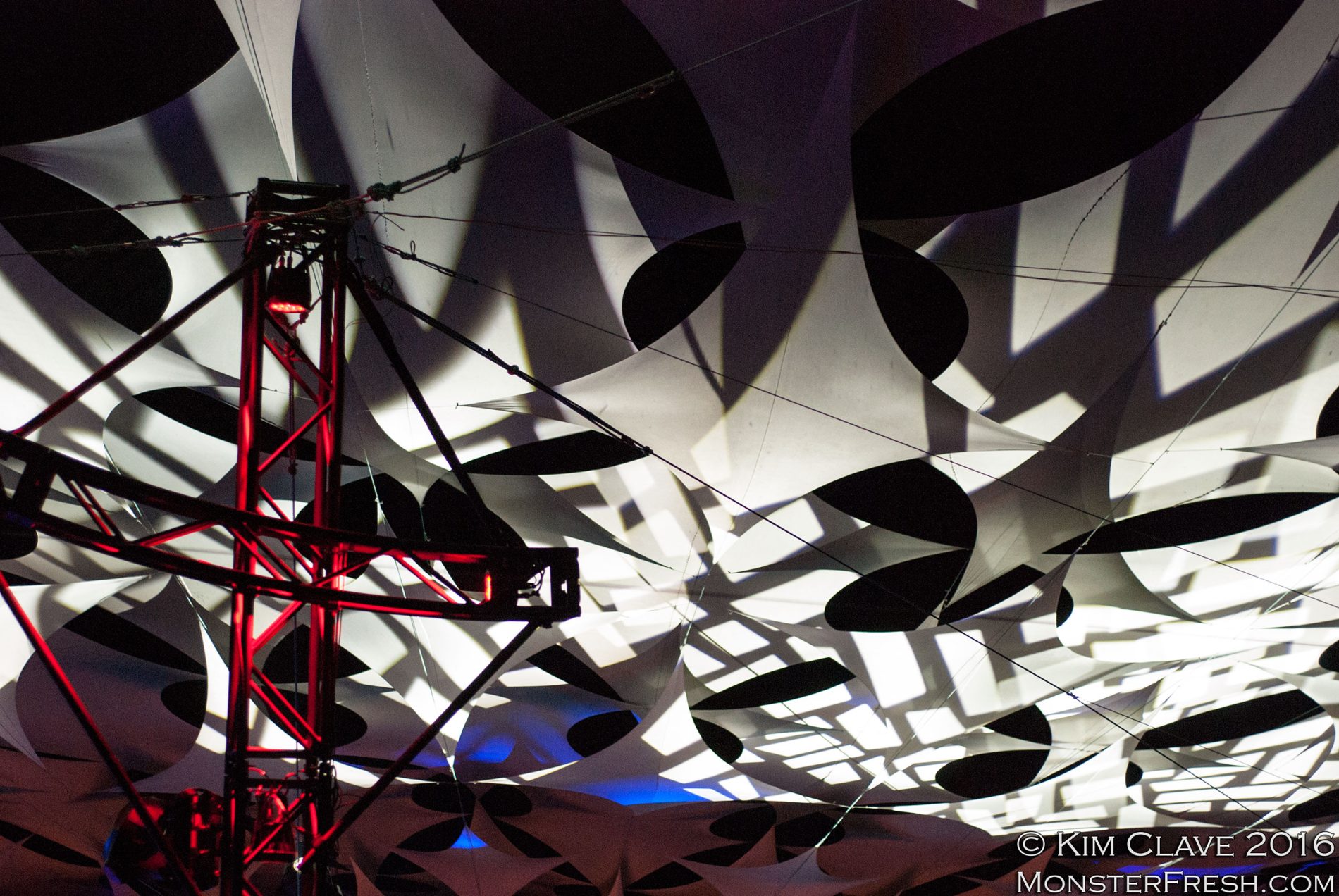
This portion of the review is, obviously, not as exciting as stage diving or impromptu midnight electronic sets deep in the woods — subjects that’ll pop up in later segments — but I always feel an obligation to address all of this stuff and get it out of the way first, because it truly is what makes this festival standout from every single other music festival that I’ve ever been to. This environment is what lays the foundation for everything else that is built around it and the reason that both artists and concert goers keep returning to this property in little known Happy Valley, Oregon; a simple family farm, pretty much every other weekend out of the year.
The Starlight Stage is one of my favorites, appearing on the opposite side of the sound booth after the Mountain Stage has closed down for the night. Pickathon is known for the majestic one-of-a-kind canopy of interlocking fabric that extends tightly over the main area and, when the stage lights hit it during these late night sets, the aesthetic is surreal; almost subaquatic, like they’re refracting through the glass of a fishbowl. It’s like an L25 on L-25. The first artist to take this stage would be a local rapper by the name of Myke Bogan and he sounded good enough from the jump for me to grab my camera and push the rest of my massive shawarma bowl to the side, momentarily, to get a closer look at what this guy was all about.
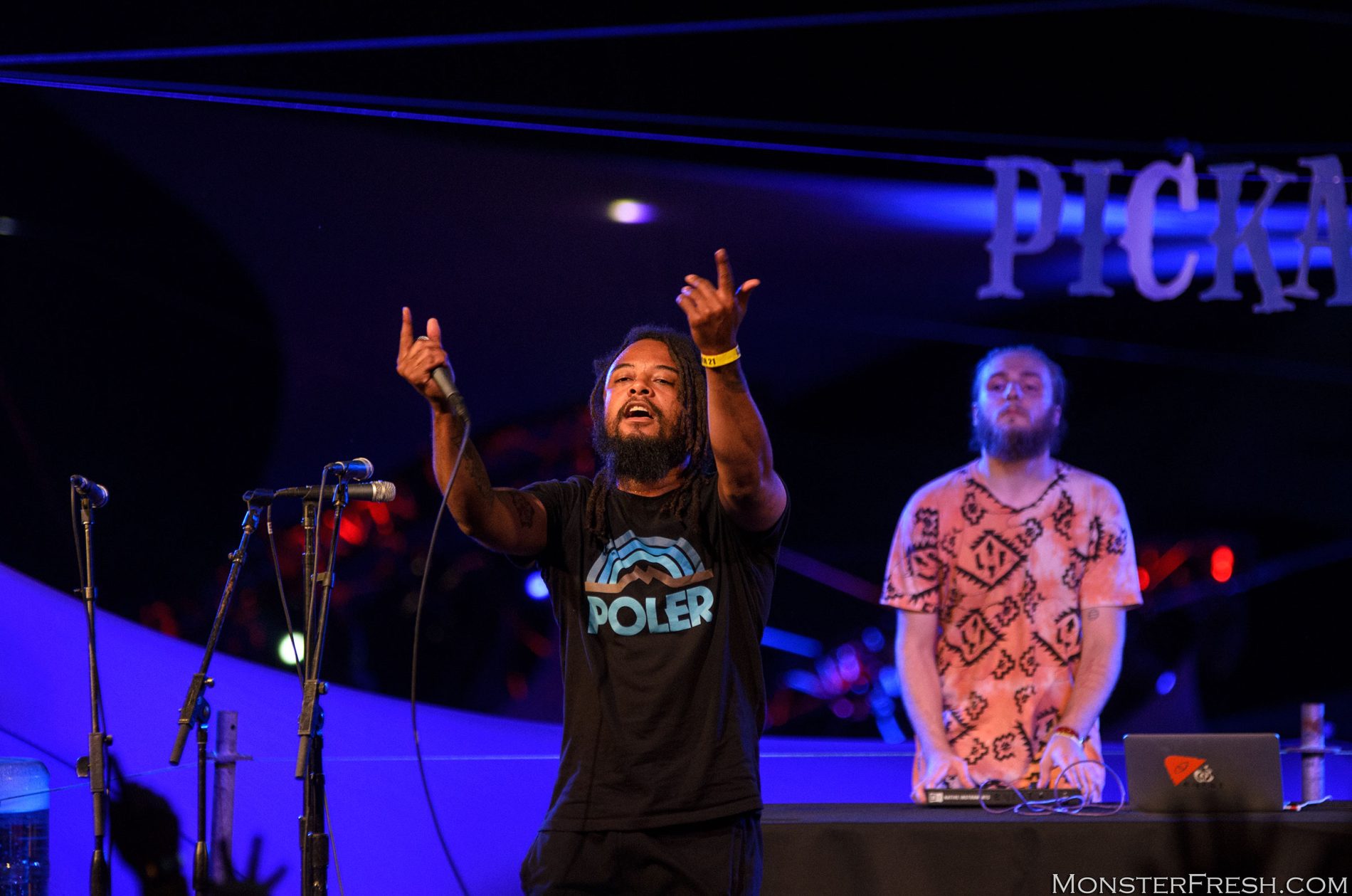
There’s a lot of nuance to what makes a quality rapper, in my opinion, but in the end, it’s really not too different than how I critique most things; basically, I just have to believe you. In that regard, I believe what Bogan is doing, which may not seem like much, but is actually pretty huge [I don’t believe most of you out there]. As a rule, I’m not a big “conscious rap” fan, because so much of it sounds like patronizing new age bullshit floating on weak lyricism, but at the same time, I’m not really interested in your car, expensive skinny jeans, about how hard your crew thinks you are, or listening to some big name pop star on a hook, in lieu of any solid verses or delivery to rely on for substance, either. With Myke, both his cadence and beats were fairly on point and he came across as someone who sincerely loves the culture, only too happy to be chosen as a representative for it at a festival that grew out of roots in folk, bluegrass, and string music. I’m not one to generally expect much from some local cat jumping on stage to perform what I, initially, assumed would be little more than a generally “good vibe” set, attempting to appeal to a demographic that didn’t exactly scream “rap fans.” But while the Pickathon audience isn’t one that I would take on face value as being overrun with hip hop enthusiasts, Bogan, who had never even played any festival prior to this, has acquired one of the most important skills for any emcee: the stage presence to allow him to direct and move the crowd at his will.
Open Mike Eagle was also on the bill this year, Shabazz Palaces have appeared on the lineup at least twice before, and the last time that we attended the festival in 2014, they had booked People Under The Stairs, so there is a concerted effort to try and have at least a minor representation of the genre provided each year. Of course, it’s still not likely that you’re going to see someone like Freddie Gibbs on this stage anytime soon, let alone The Geto Boys. They’ve managed to expand the scope of what the lineup has to offer, but, as with just about everything else they’ve done, it’s been a fairly organic process and remained a family friendly environment, for the most part, even as the more raucous acts have infiltrated the schedule over the years. That being said, while Bogan was definitely personable and in good spirits, he didn’t seem to be toning down his set much, which involved a track called “Pink Cocaine,” liberal use of the word “nigga,” references to pills and getting head, and even a joint getting busted out at some point. I headed backstage early to get a beer and, while we were back there, I was pretty sure that I heard him rapping over “Wonderwall,” by Oasis. No set feelings on that last part, but I figured it was worth a mention.
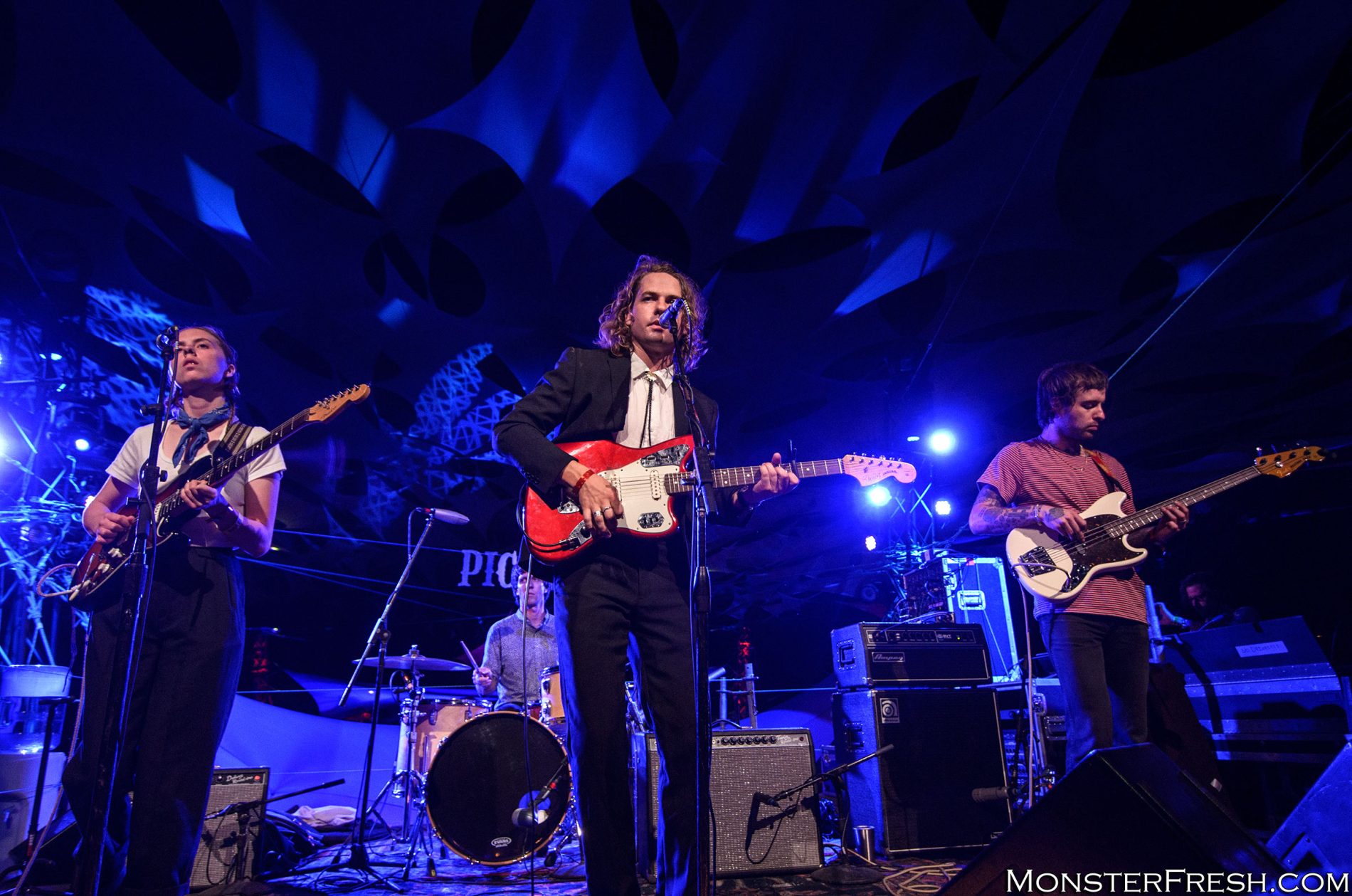
Kevin Morby was the only real Thursday set that I was focused on hitting. The only other time that I’d ever caught the songwriter prior to this was way back in 2009, when he was still handling a bassist/multi-instrumentalist roll as part of fellow Pickathon veterans, Woods. To put that into perspective, the show that I saw had Woods opening for Swedish psych-folk outfit, Dungen, and, the night before in Portland, Kurt Vile was even opening the show for both of them. After parting ways with the New York outfit, Morby relocated to Los Angeles and embarked on his solo career, joined by drummer, Justin Sullivan, from his other project, The Babies, which Kevin had formed with Cassie Ramone of Vivian Girls. Rounding out his current band is bassist, Cyrus Gengras with Meg Duffy on guitar, and I can’t stress enough how solid of a unit they are.
When we were first getting press releases about Morby‘s 2013 debut — his ode to New York, Harlem River — it was clearly well written stuff, but it wasn’t as immediately engaging to me as the beloved project that he had walked away from. That’s most likely due to the unique voice of Woods frontman, Jeremy Earl, while Kevin‘s had a more familiar tone; at times, almost, Dylanesque — a comparison that’s, admittedly, all too easy to make. Some of his influences were definitely on his sleeve, but as with many of my favorite songwriters (David Berman, Bill Callahan, Townes Van Zandt, etc.) his work can be more of a slow burn than something that is guaranteed to crack you over the skull on first listen. Then again, I get the feeling now that all you really need to do is see him perform live with his band just once to get that sweet dome split. Playing material that spanned all 3 of his releases, including his latest, Singing Saw, and that very first single from the first album, “Miles, Miles, Miles,” it all sounds like nothing else to me, except Kevin Morby. And as one ex-convict/compulsive tidier has put it an endless number of times: it’s a good thing.
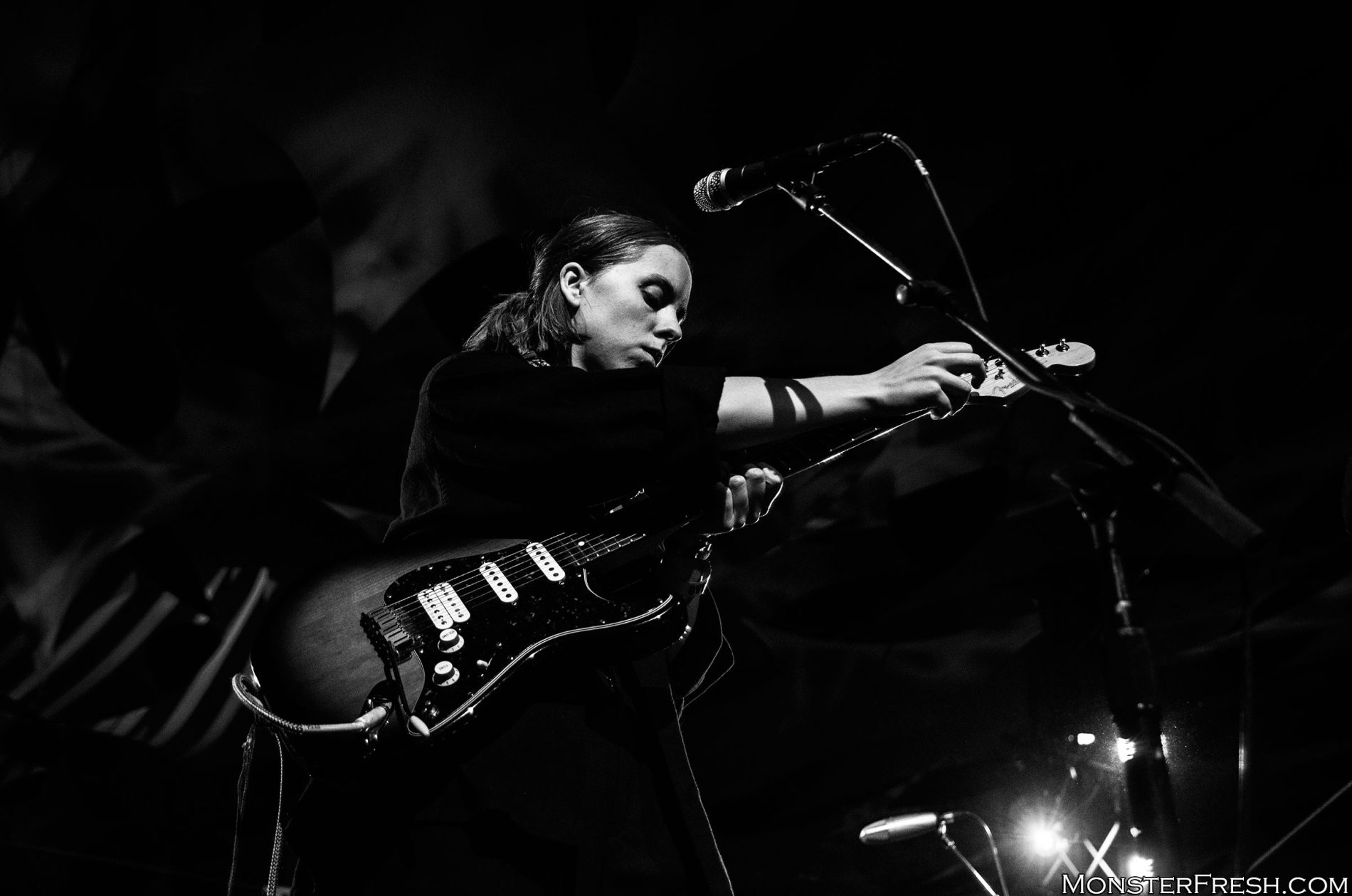
The one thought that kept going through my mind during their set — as evidenced by the chicken scratch in my notebook — was that they were really “pumping blood” into these cuts and bringing them to life, which is the most that you could ever hope from any live show. The rhythm section was tight, but the real standout was Duffy, who records solo under the moniker of Hand Habits and whose guitar work is so brilliantly subtle that it sneaks up on you. Her and Morby trade solo duties in a way that reminded me slightly of Television, in a live capacity, with every guitar line, whether a simple phrase or one employing the use of a slide, focused on serving the overall composition, first and foremost, rather than being utilized as a moment to shine for the individual. Their time wrapped nicely with Kevin doing a solo rendition of Townes Van Zandt‘s “No Place To Fall,” before leaving the stage.
Morby was on my list of suggestions to book for last year’s lineup, but while he did wind up on the bill, I wasn’t in attendance to see it. His decision to come back this year isn’t only welcomed, it isn’t too surprising, as he referenced his return, at one point, by stating that Pickathon might be “the best festival of all time.” It’s a common sentiment that you’ll hear from the artists that perform there and it worked out great for me, since it gave me an opportunity to finally see him live. And that’s another great thing about this festival, which allows it to stand out from the pack; most artists will perform at least 2 sets over the weekend, helping eliminate some of those pesky scheduling conflicts that multi-stage events like this are typically known for.
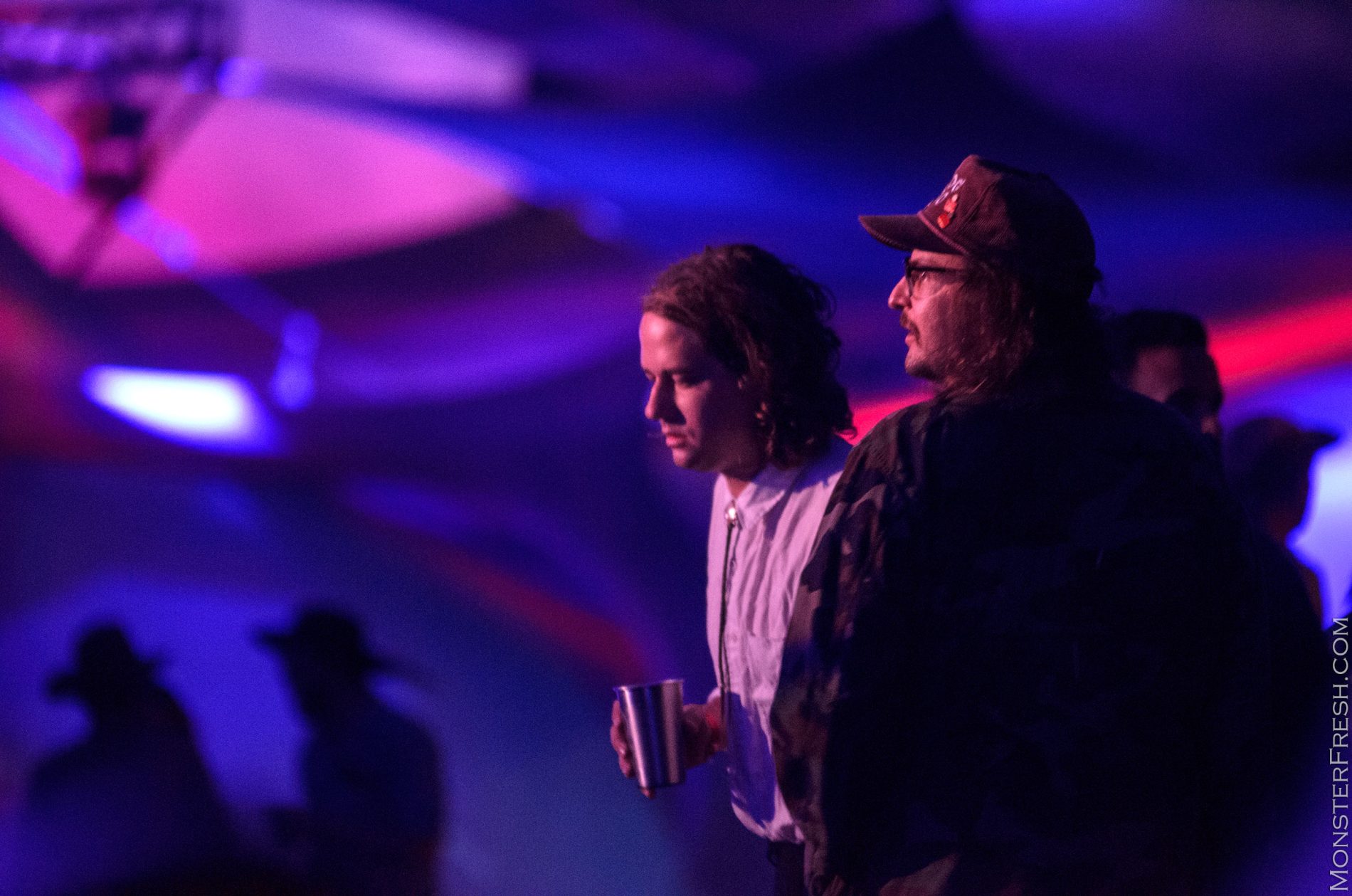
The next act set to perform on the Starlight Stage was the French-Cuban duo, Ibeyi, but although they made it out fine, their equipment was held up due to a French airline strike. They were replaced by Portland‘s Federale, a band formed by current Brian Jonestown Massacre bassist, Collin Hegna that plays Ennio Morricone-esque spaghetti western style jams, not too unlike the group Spindrift. I wasn’t familiar with them, but they sounded pretty, at least from where we ended up over by the Galaxy Barn.
The Galaxy Barn is… well, it’s a barn. The larger of two barns-turned-stages on the premises, actually. This is where the more rowdy punk, garage, or psych rock style acts will typically perform each night and it tends to get fairly packed in there. To accommodate for that, there are large screens outside streaming the show for the spill-out crowd, or anyone else that simply prefers to watch from a distance as they hang out around the bonfire adjacent to it, or relax on the makeshift hay bale seating in the large beer garden/dance area below. In the past, it hasn’t been uncommon to see the bonfire crowd include among them such artists as Ty Segall or King Tuff, both of which have been attending and/or performing at Pickathon for the last 4 years and had made the effort to show up for the early Thursday entry this year, even though they didn’t play their first set until the following day.
Tonight the Galaxy Barn was being taken over by Chanti Darling, who, by my best estimation was a project in the vein of the sort of synth-heavy throwback R&B acts that were affiliated and/or produced by Prince and Jimmy Jam and Terry Lewis in the 1980s. A pair of backup dancers moved in unison with the frontman, wielding the ferocity of a Paris Is Burning danceoff, possessing enough pure crowd stirring energy to rival the queen of bounce, Big Freedia, herself. This was a fucking party going down in there, but just as we were trying to estimate whether or not it would even be possible to jam ourselves into that packed, yet joyous, mob, I ran into an old friend of mine outside and caught up with him until, eventually, fading into the backstage area to fill my cup again.
The backstage area at the Galaxy Barn was a trip, blacklights illuminating the scene as if we were in a substantially better version of those dayglo Joel Schumacher-directed Batman sequels in a parallel universe where they weren’t complete and utter garbage. A shelf full of PBR cans painted with neon paint radiated behind me along with the most random features on anybody that I would bother to glance at. There was a DJ somewhere and “Sex Shooter” by Appolonia 6 was pumping through the speakers. “Erotic City” was next. I was feeling pretty good about myself around then, but it was time to crash out for the night. This shit hadn’t even officially started yet and we, literally, had a dozen sets we wanted to catch once we woke up. Over the next 3 days, I would stomp around through the woods inhaling equal parts beer to dirt, getting more exercise than I will for the rest of the year in its entirety. Severely overlooking the fact that I’m now an “old dude,” while undervaluing the importance of sleep, I would become physically sick and bedridden, this time, almost as immediately as returning home. It was definitely worth it.